Massie Surname Ancestry ResultsOur indexes 1000-1999 include entries for the spelling 'massie'. In the period you have requested, we have the following 205 records (displaying 31 to 40): Single Surname Subscription | | | Buying all 205 results of this search individually would cost £1,118.00. But you can have free access to all 205 records for a year, to view, to save and print, for £100. Save £1,018.00. More... |
These sample scans are from the original record. You will get scans of the full pages or articles where the surname you searched for has been found. Your web browser may prevent the sample windows from opening; in this case please change your browser settings to allow pop-up windows from this site. Letters and papers of James first duke of Ormond, Lord Deputy of Ireland
(1679-1681)
This correspondence deals with a large variety of personal and public affairs in Ireland and England. MASSIE. Cost: £4.00.  | Sample scan, click to enlarge
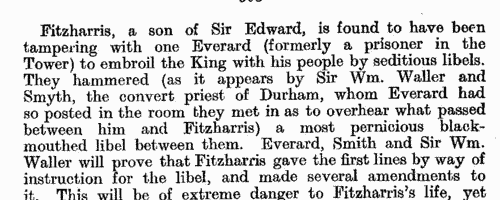
| Official Papers
(1682)
The State Papers Domestic cover all manner of business relating to Britain, Ireland and the colonies, conducted in the office of the Secretary of State as well as other miscellaneous records.
MASSIE. Cost: £4.00.  | Sample scan, click to enlarge
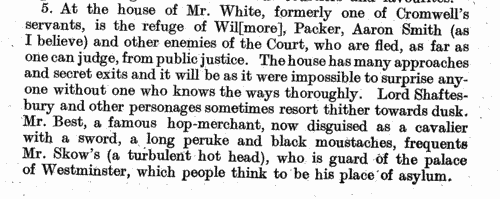
| Darien Company: Edinburgh Subscription List
(1696)
The Company of Scotland Trading to Africa and the Indies was established by Act of Parliament, a general subscription list being opened at Edinburgh from 26 February to 1 August 1696, and a separate one at Glasgow from 5 March to 22 April 1696. These lists were published in 1849 by the Bannatyne Club as an appendix to a volume called The Darien Papers. The lists give date, full name, sometimes an indication of address, and the amount of the subscription, in pounds Scots.MASSIE. Cost: £6.00.  | Sample scan, click to enlarge
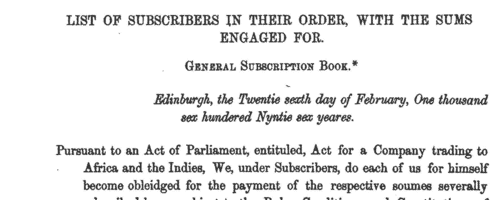
| Boys at Eton
(1441-1698)
King Henry VI founded a college at Eton in Buckinghamshire in 1440, 'to the praise, glory and honour of the Crucified, the exaltation of the most glorious Virgin His mother, and the establishing of holy Church His bride'. From this foundation has evolved the modern public school. Sir Wasey Sterry compiled a register for the college from 1441 to 1698, from a variety of surviving records, and including groundwork from his 'A List of Eton Commensals' of 1904, and R. A. Austen-Leigh's 'A List of Eton Collegers' of 1905. This resulting 'Eton College Register' was published in 1943. Because of the variety of underlying materials, the entries vary greatly in depth: some names survive only as a surname of not too certain date. In the fullest entries, the surname (often with a variant spelling) is given first, in bold, followed by the years of entry and leaving. The christian name is given next; then birthplace, and name of father. The initials K. S. (King's Scholar) indicate a scholar on the foundation. There will then follow a summary of the man's career, death, burial and probate; and the sources for the information, in italics, at the end of the entry.MASSIE. Cost: £4.00.  | Sample scan, click to enlarge

| Nottinghamshire Marriage Licences
(1577-1700)
Nottingham Archdeaconry, which was almost coextensive with the county of Nottingham, lay in the diocese and province of York, but it had substantially independent jurisdiction for both probate and the issuing of marriage licences. These are abstracts of the archdeaconry marriage licences: they usually state the groom's address, occupation, age, and condition; the bride's address, age and condition; and the names of the churches or parishes at which it was intended the marriage would be celebrated. Not all licences led to marriages. Where the age given is 21, it should be construed as '21 or over'. There was no obligation for the marriage to take place at the parish suggested, but the licence would only be valid within the county. These abstracts have been annotated with extra information found on the marriage bonds. 26 Nottinghamshire parishes (Beckingham, Darlton, Dunham, Eaton, North Leverton, Ragnall, Rampton, South Wheatley, Cropwell Bishop, Bleasby, Blidworth, Calverton, Caunton, Edingley, Farnsfield, Halloughton, Holme, Kirklington, Morton, North Muskham, Norwell, Oxton, South Muskham, Southwell, Upton and Woodborough) lay within the small peculiar jurisdiction of Southwell, which issued its own licences: abstracts of these for the period 1588 to 1754 are also included here.MASSIE. Cost: £4.00.  | Sample scan, click to enlarge

| Lancashire and Cheshire Marriage Licences
(1691-1700)
Licences for intended marriages in Chester archdeaconry, which covered Cheshire and Lancashire south of the Ribble (by far the most populous part of that county). As shown in the sample scan, licences to practise midwifery and to teach are also included. The index covers bondsmen as well as brides and grooms.MASSIE. Cost: £4.00.  | Sample scan, click to enlarge
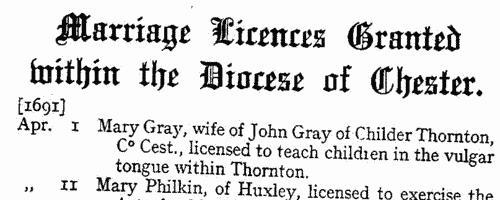
| Harley family papers
(1690-1708)
This collection of letters and papers is particularly interesting in that it includes a file of petitions and memorials to queen Anne from 1704 to 1708, and a similar file of petitions to Robert Harley in his post as Secretary of State during the same years. The collection includes a few items earlier than 1690. Mostly relates to Britain and Ireland.MASSIE. Cost: £4.00.  | Sample scan, click to enlarge
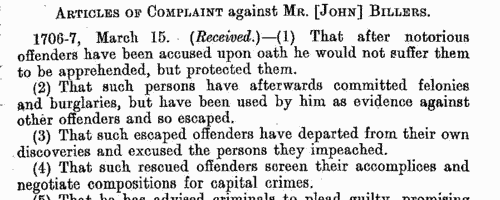
|  Apprentices registered at Chester
(1717-1719) Apprentices registered at Chester
(1717-1719)
Apprenticeship indentures and clerks' articles were subject to a 6d or 12d per pound stamp duty: the registers of the payments usually give the master's trade, address, and occupation, and the apprentice's father's name and address, as well as details of the date and length of the apprenticeship. There are central registers for collections of the stamp duty in London, as well as returns from collectors in the provinces. These collectors generally received duty just from their own county, but sometimes from further afield. Because of the delay before some collectors made their returns, this register includes indentures and articles from as early as 1716. (The sample entry shown on this scan is taken from a Norfolk return)MASSIE. Cost: £8.00.  | Sample scan, click to enlarge

|  Masters of Apprentices registered at Edinburgh
(1717-1719) Masters of Apprentices registered at Edinburgh
(1717-1719)
Apprenticeship indentures and clerks' articles were subject to a 6d or 12d per pound stamp duty: the registers of the payments usually give the master's trade, address, and occupation, and the apprentice's father's name and address, as well as details of the date and length of the apprenticeship. There are central registers for collections of the stamp duty in London, as well as returns from collectors in the provinces. There was a single collection for the whole of Scotland, made in Edinburgh. The sums collected are recorded in Scottish money, with conversion to sterling for transfer to London. A Scottish pund was worth 20 English pence. Because of the delay before some collectors made their returns, this register includes indentures and articles from as early as 1716. (The sample entry shown on this scan is taken from a Norfolk return)MASSIE. Cost: £8.00.  | Sample scan, click to enlarge

|  Apprentices registered at Edinburgh
(1719-1721) Apprentices registered at Edinburgh
(1719-1721)
Apprenticeship indentures and clerks' articles were subject to a 6d or 12d per pound stamp duty: the registers of the payments usually give the master's trade, address, and occupation, and the apprentice's father's name and address, as well as details of the date and length of the apprenticeship. There are central registers for collections of the stamp duty in London, as well as returns from collectors in the provinces. There was a single collection for the whole of Scotland, made in Edinburgh. The sums collected are recorded in Scottish money, with conversion to sterling for transfer to London. A Scottish pund was worth 20 English pence. Because of the delay before some collectors made their returns, this register includes indentures and articles from as early as 1718. (The sample entry shown on this scan is taken from a Norfolk return)MASSIE. Cost: £8.00.  | Sample scan, click to enlarge

|
Research your ancestry, family history, genealogy and one-name study by direct access to original records and archives indexed by surname.
|













